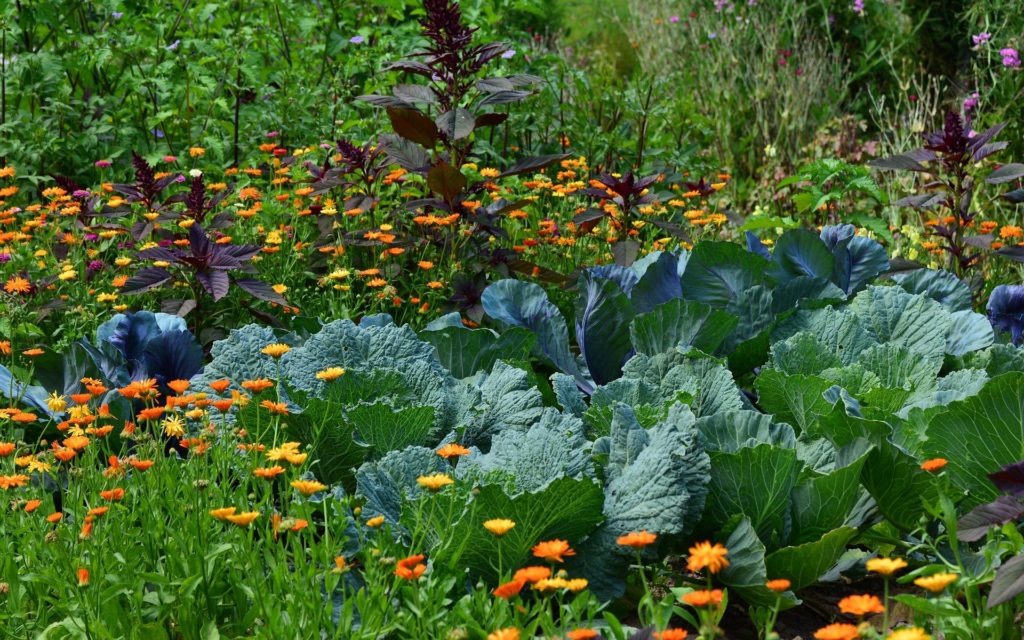Seeing God in the Garden

God designed growing things to teach us Kingdom principles. The garden was Adam’s first job and his first classroom. It can be our classroom as well. The Bible is full of garden imagery: seeds, plants, weeds, pruning watering, harvests.
Recently I asked my wife, Marilyn, if she wanted to sit with me in our back yard and think about the lessons God could teach us from our newly planted garden. We grabbed our Bibles, journals, and pens and planted ourselves in our patio chairs so we could slow down and study our garden. We stayed for the whole morning.
Each passing hour opened our eyes to new insights. Like a peacock fanning its fluorescent wings, God was on display. My garden is filled with plants and trees, but it is also filled with principles of life I can use in the world beyond my backyard.
Growth is almost always slow and incremental.
As soon as I plant my garden, I get impatient. It does not grow fast enough for me. Plants have a natural, pulsing rhythm that dislikes speed. Its gradual stages of growth create stability and strength. Every day I inspect my plants and trees as they inch upward. I have developed a strange respect for their independence. I feed them and protect them, but they still resist my desire for them to speed things up.
I like fast better than slow, but I must recognize that relationships grow slowly. People, like my garden, do not like to be pushed. When I mentor young leaders, I help them start with small goals that grow into habits, then I invite them to the next level of development. This type of discipleship takes more time, but the end result is deeply rooted.
Gardeners live by faith.
If a gardener plans and works based only on what she can see, her garden will never survive. The essence of gardening is understanding what is hidden in the subterranean world of insects, larvae, and Medusa-like tangles of roots. Small, invisible things keep my plants flourishing.
God’s classroom (my garden) is bustling with activity, some visible, some invisible. I have faith God is working in secret in my garden, just the way He is working everywhere. If I could always see what God is doing behind the scenes I would not need faith. Faith is a form of humility in which I recognize that whatever I do, someone else has contributed something to it. “That’s the truth of the saying, ‘This one sows, that one harvests.’ I sent you to harvest a field you never worked. Without lifting a finger, you have walked in on a field worked long and hard by others” (John 4:38, MSG).
When I think that people are growing in my Bible study because I plan and work hard, a subtle pride emerges. That is checked when I realize that a person grows spiritually because of circumstances and people I am not even aware of. I thank God for the contribution of churches, other ministries, and other people who influence the men I am helping to grow. They are the “invisible things” that keep life flourishing.
Gardeners understand the right kind of stress.
My plants will not grow without stress; they actually need it. Plants can be stressed by temperature, wind, and moisture. A gardener understands that in the wrong amount these can weaken and kill plants. These same things in the proper amount can make plants grow stronger, more fruitful, and more beautiful.
Gardeners can either overprotect their gardens or under-protect them. Fortunately, plants send warning signals when something is wrong, before healthy stress becomes damaging stress. Gardeners are stress managers. Leaders are stress managers, too. I must manage my own stress as well as the stress of those I work with. I need to be able to tell good stress from bad stress.
Plants stay true to themselves.
A rose will never become a cactus; a lilac bush will never change into an onion. Plants and trees are not very creative, they are bound by their molecular structure to be what they started out as. They grow but do not lose their essence in the process. Here’s how the Bible puts it (Genesis 1:11-12, NIV):
Then God said, “Let the land produce vegetation: seed-bearing plants and trees on the land that bear fruit with seed in it, according to their various kinds.” And it was so. The land produced vegetation: plants bearing seed according to their kinds and trees bearing fruit with seed in it according to their kinds. And God saw that it was good.
This passage encourages me to stay true to who I am as an image bearer of the One who planted me where I am at this very moment.
I have been a Christ follower for nearly 40 years now, but there are still times when I try to impress people to get them to like me. (“When push came to shove they cared more for human approval than for God’s glory,” John 12:43, MSG.) In those situations, I can become like what I am not, a different kind of person. But as an image bearer I do not need to draw my strength from others’ approval.
Gardeners push back the fall.
After working in the garden one day my wife casually commented that we had “pushed back the fall.” She was commenting about the curse that Adam left behind for all of us (and himself as well). Adam’s refusal to follow God’s command tilted the axis of our world. Order was reversed, disorder became normative. Along with Adam we have a job description to tend and till, to help restore order and nurture life. To yank up weeds, to aerate the soil, or to do surgery on a diseased limb is to slow down the spiral of death. Gardening is, indeed, a divine enterprise.
The fall left us with a broken world. Almost every day I come across someone or something that needs a little breath of life, in one form or another. Anything I do that brings life, however grand or subtle, is God’s work. It might be a note I write to my pastor thanking him for Sunday’s sermon, or mowing my neighbor’s lawn.
Every garden needs an advocate.
When I start my winter cleanup, I get the pruning impulse. I love to cut and saw and shape things, whether they need it or not. Wisely, my wife will ask me if I know what time of the year that particular plant (the one I just assaulted) needs pruning (if ever). “Oh. . . . ” I pause, buying time to avoid looking ignorant.
Marilyn has become an advocate for our plants and trees. I imagine her in front of the plants, arms stretched out in barricade fashion like a police officer protecting a small child. Only history will reveal how many lives she has saved.
Two weeks ago, she was happy when I brought home a battered rose plant with sad, drooping buds. I became its advocate. I looked out my window this morning to see it standing upright, at full attention.
When I pray for others’ needs, it is a form of advocacy. Timothy modeled this: “I urge you, first of all, to pray for all people. Ask God to help them; intercede on their behalf, and give thanks for them” (1 Timothy 2:1, NLT). No one can become a good leader until he or she cares enough to be an advocate.
Never judge a garden by its size.
We like big things: the biggest building, business, news item of the day. Bigger isn’t better, though; better is better. A small, window-box garden can be just as significant to a senior citizen as a one-acre plot to a Master Gardener. Five gardeners could look at my garden and each of them would be drawn to different elements. Beauty is subjective. A horde of wildflowers, barberry bushes dangerous with thorns, daffodils in carnival yellow, all have their own kind of beauty, none of it related to size. Few would comment on how large my garden is. It is about the trees and plants, not the size of their home.
My garden has reminded me to look for the little things in a person’s life that make them unique. I can find something interesting or beautiful about almost anyone . . . if I look for it.
Plants and trees preach sermons.
The writer of Proverbs says, “I took a long look and pondered what I saw; the fields preached me a sermon and I listened” (Proverbs 24:30-34, MSG).
Plants and trees have messages for all. They call out by grabbing our nose with a stunning fragrance or by surprising us with a swipe of purple drawn on a lily-white petal. But more than arresting our senses, they remind us of how God wants us to act in the world He calls us to live in. Whenever I see a garden, I will take a long look to be sure I don’t miss the sermon.
About the Author


